Innovations in Clinical Care
The Innovations in Clinical Care award is presented to the physician, nurse and/or team who demonstrates a visionary approach to problem solving and performance improvement.
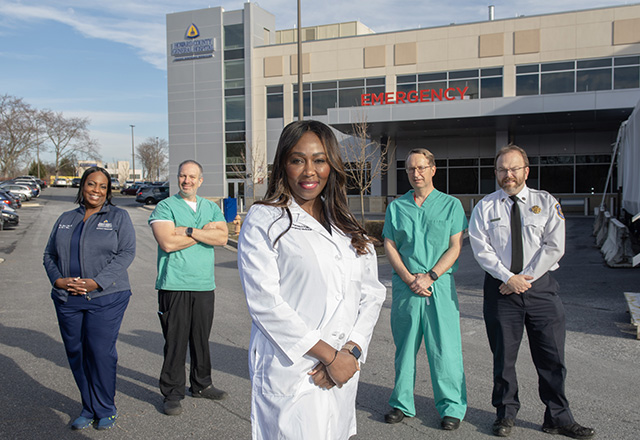
Patricia Pugh, D.O., and the Emergency Cardiac Care Workgroup
Johns Hopkins Howard County Medical Center
Chair of Emergency Medicine and Medical Director of Emergency Services
The emergency cardiac care work group is an interdisciplinary team with members from the hospital’s emergency department and cardiac catheterization lab, the Johns Hopkins emergency medical services (EMS) faculty and EMS program leadership from the Howard County Department of Fire and Rescue Services. Due to the group’s work, Johns Hopkins Howard County Medical Center’s catheterization lab activation times are among the shortest in Maryland.
In 2022, Patricia Pugh and the work group continued their innovation by piloting a program to take patients that EMS identifies as having an acute ST-segment-elevation myocardial infarction (STEMI) directly to the cardiac catheterization suite upon emergency department arrival. The impressive results of this pilot showed a greater than 40% reduction in time from first medical contact by EMS to revascularization for victims of heart attack.
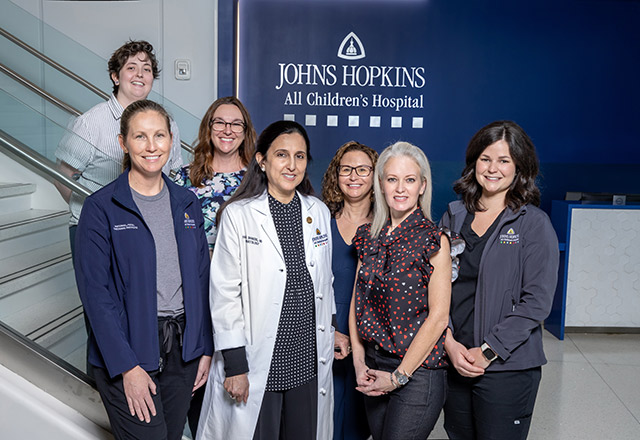
Fauzia Shakeel, M.D., and the Neonatal Intensive Care Unit CUSP Team
Johns Hopkins All Children’s Hospital
Neonatologist Fauzia Shakeel is the physician champion for the Comprehensive Unit-Based Safety Program (CUSP) team in the hospital’s level IV neonatal intensive care unit (NICU). The team takes an out-of-the-box approach to safety initiatives and the challenge of communicating with over 200 NICU staff members. Dr. Shakeel and the team expanded a hospitalwide CUSP initiative on preventing “stealth orders” — an accidental and temporary lapse in communication among a physician, nurse and respiratory therapist. The CUSP team provided education, developed a clinical decision tree and verification statement, and shared these strategies frequently to help ensure timely delivery of the correct care to patients. Other innovations include devising a label for intravenous tubing to improve the accuracy of infusion orders, and developing a concise handout — 5 Things to Know — to enhance communication and shared knowledge on the unit. Dr. Shakeel and her CUSP colleagues continue to demonstrate their commitment to patient safety by involving NICU staff members in these efforts.
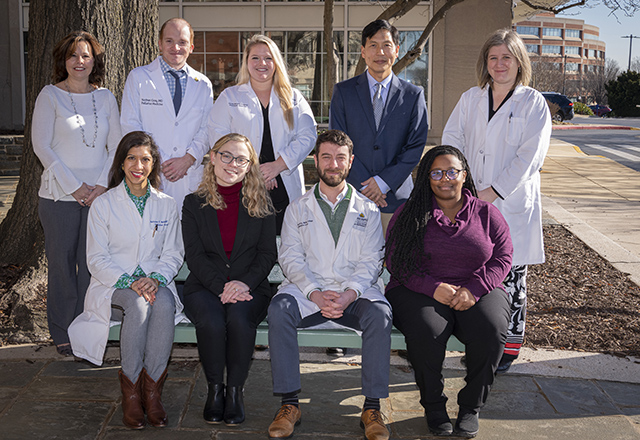
David Wu, M.D., and the Palliative Care Team
Johns Hopkins Bayview Medical Center
David Wu and the palliative care team have had a significant impact on clinical care through the creation and implementation of the 3-Act Model. This innovative approach to goals of care communication focuses on understanding the patient’s story and making the patient’s voice a priority in decision making.
During the last few years, Dr. Wu and the team have integrated 3-Act Model training into several programs and inpatient units. The curriculum includes reflection on literature, unique role-play scenarios and feedback from trainers based on an assessment tool. They have trained more than 100 doctors as well as many other multidisciplinary team members, resulting in significant improvement in communication skills and clinical outcomes.
Dr. Wu and the palliative care team have also have disseminated their work on the 3-Act Model in a series of national and international talks and publications. Subsequently, other institutions across the country have adopted the approach.
Since 2017, Dr. Wu and the team have expanded the program’s clinical reach severalfold, and it has surpassed productivity targets and demonstrated impact on value metrics.
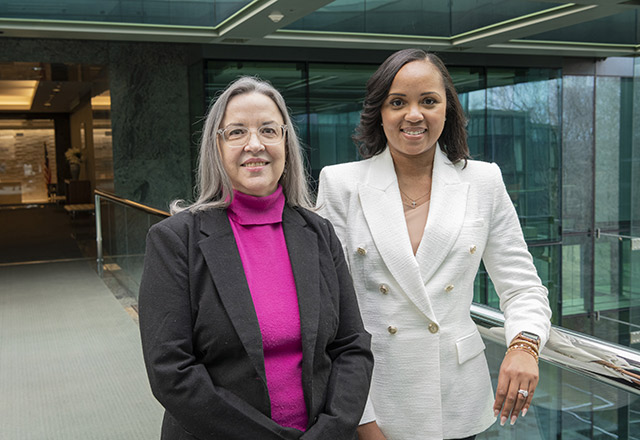
Loretta Sutphin, M.D., Amanda Thomas, M.H.A., and Johns Hopkins Medicine Primary VirtualCare
Johns Hopkins Community Physicians
Johns Hopkins VirtualCare, led by Loretta Sutphin, office medical director, and Amanda Thomas, practice administrator, supports primary care patients across Johns Hopkins Medicine (JHM) by offering telemedicine services for same-day or next-day acute primary care. Since its inception in April 2021, the practice has served over 18,000 patients who had more than 21,000 visits. It continues to grow in volume monthly, with about 3,000 visits per month currently. Easily accessible and convenient, Johns Hopkins VirtualCare has enhanced access and satisfaction for patients while increasing capacity at primary care practices. Johns Hopkins VirtualCare offers a higher degree of care continuity than other external convenience care options, and it seamlessly coordinates and communicates with JHM primary care teams. Additionally, Johns Hopkins VirtualCare provides virtual primary care float services and a dedicated virtual therapeutics clinic for patients with COVID-19. This innovative virtual program embodies the JHM goals to “make Johns Hopkins Medicine easy” through enhanced access via digital tools and to “improve the quality and affordability of health care” by impacting utilization reduction and lowering the cost of care.
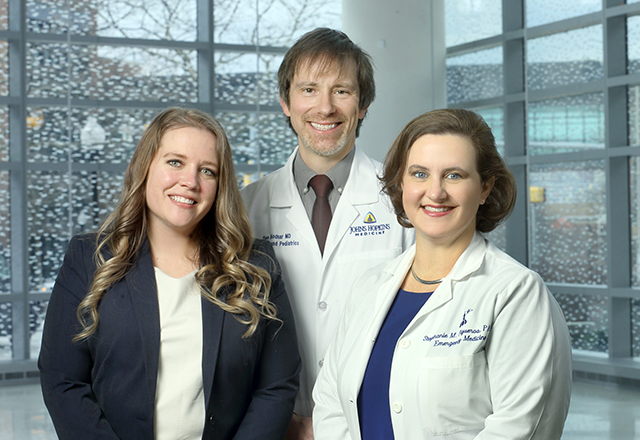
Ben Bodnar, M.D., and the Office of Care Transformation
The Johns Hopkins Hospital
Director of Quality and Safety, Division of Hospital Medicine
When the COVID-19 pandemic began, there was no playbook on how to treat the infection and its complications. And as the pandemic continued, the science and guidance changed rapidly — sometimes on a week-by-week basis. That’s why Ben Bodnar’s work to design, update and disseminate clinical decision support tools to help front-line clinicians care for patients with COVID-19 has been invaluable for the entire Johns Hopkins Health System.
With the help of Kathleen Anicich and Stephanie Figueroa, clinical care guideline leads in the care transformation office, Dr. Bodnar spent hundreds of hours developing easy to use algorithmic flowcharts that were made available to all inpatient practitioners via Epic. These flowcharts, which were updated weekly, offered a “one-stop shop” for clinicians to make decisions about medication, what labs to order, isolation approaches, safe discharge practices and more. The guidelines have been accessed nearly 20,000 times by more than 1,450 practitioners in roughly 6,800 unique patient encounters. The work of Dr. Bodnar and his team has been essential in ensuring that Johns Hopkins front-line clinicians have the tools they need to succeed in the face of a pandemic.
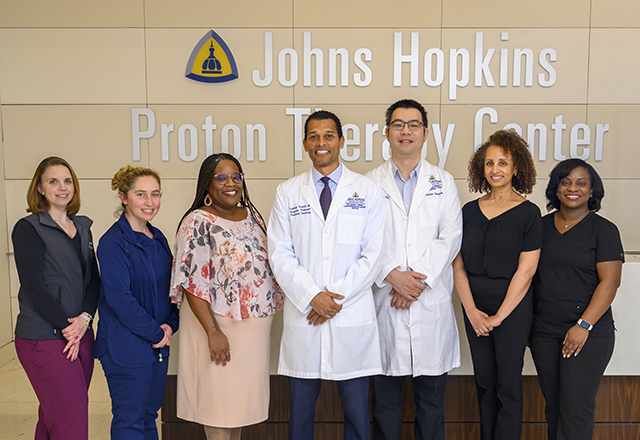
Curtiland Deville Jr., M.D., and the Proton Therapy Team
Sibley Memorial Hospital
Medical Director, Johns Hopkins Proton Therapy Center
Curtiland Deville Jr. is an expert in proton therapy and a leader in several institutional and national clinical trials. He treats genitourinary malignancies, including prostate cancer and soft tissue sarcomas, and is dedicated to creating individualized treatment plans for each patient. A delight to work with, Dr. Deville forms amazing relationships with his patients and leads collaboration on the proton therapy team to include clinical dosimetry, physics, radiation therapy and nursing. He is deeply knowledgeable in his field, and he works with the proton team to contribute to research and introduce innovative technology to benefit patients. By providing radiation and proton therapy for his patients, Dr. Deville has saved many lives.
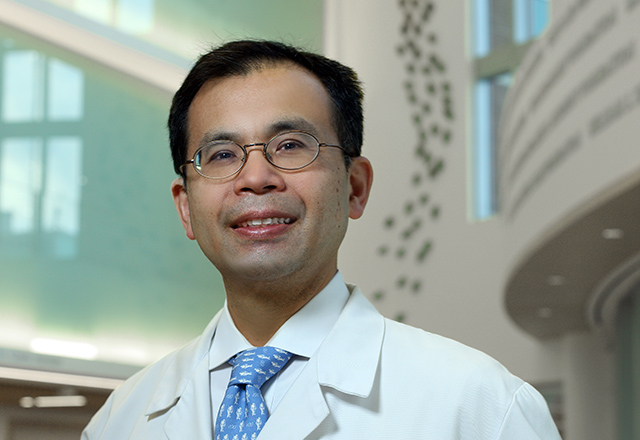
Wade Chien, M.D.
Suburban Hospital
Professor of Otolaryngology–Head and Neck Surgery
Wade Chien is a highly regarded otolaryngologist who specializes in hearing loss and balance issues. Dr. Chien and a team of talented surgeons, including Carrie Nieman and Deepa Galaiya, have brought to the region a novel technique for minimally invasive endoscopic treatment of middle ear pathologies including tympanic membrane perforation, otosclerosis, chronic otitis media and cholesteatoma. This innovative, noninvasive approach that goes through the patient’s ear canal instead of cutting behind the ear reduces postoperative pain and results in a shorter recovery period.
In 2009, Wade Chien completed a fellowship at The Johns Hopkins Hospital, and he has been a school of medicine faculty member since 2011. A major factor in his decision to specialize in otolaryngology was his love for music and the opportunity to help patients reconnect with their loved ones and the world around them by restoring their hearing.
